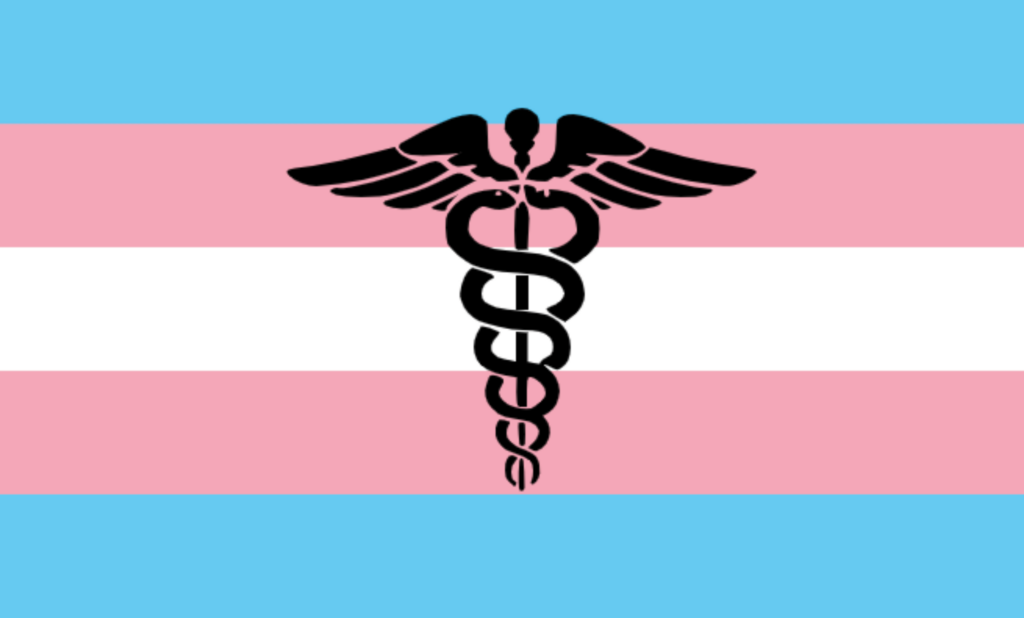After Florida banned Medicaid coverage of medically necessary gender-affirming care for transgender Medicaid beneficiaries, LGBTQ and health advocacy groups Lambda Legal, Southern Legal Counsel, Florida Health Justice Project, and National Health Law Program filed a federal lawsuit challenging Florida’s anti-transgender healthcare rule.
The lawsuit was filed on behalf of four plaintiffs: August Dekker (he/him), a 28-year-old transgender man, Brit Rothstein (he/him), a 20-year-old transgender man, and two transgender adolescents, Susan Doe (represented by her parents Jane and John Doe) and K.F. (represented by his mother Jade Ladue).
August Dekker (he/him) — August is a 28-year-old transgender man who lives in Hernando County, Florida. August is unemployed and receives Supplemental Security Income due to disability, as he lives with debilitating rheumatoid arthritis. As a result, August has been on Medicaid since 2014. August was incorrectly assigned the sex female at birth. Since he was 5 years old, August remembers being uncomfortable living as a girl. August has been diagnosed with gender dysphoria. His medical and mental health providers have recommended he be provided with hormone therapy as treatment for gender dysphoria, and which Medicaid has until now covered. In April 2022, upon the recommendation of his providers, August had chest surgery as a treatment for his gender dysphoria which brought his body more into alignment with his identity, which Medicaid covered. However, August needs continued hormone therapy, which he would be denied under Florida AHCA’s new rule, which is causing him a great deal of anxiety and distress. As he said, his medical care “has given me the ability to not hate myself or my body and has brought great comfort to my life.” Given August’s limited income, he would not be able to cover the medical care he needs out of pocket, which makes him worry about both his physical health and his possible exposure to discrimination and violence.
Brit Rothstein (he/him) — Plaintiff Brit Rothstein is a 20-year-old transgender man, who has been diagnosed with gender dysphoria and receives his health care coverage through Florida’s Medicaid program. Brit is a junior in college at the University of Central Florida and is studying digital media and minoring in information technology. At the recommendation of his health care providers, Brit receives hormone therapy, and he is scheduled to obtain chest surgery in December 2022, both as medically necessary treatments for his gender dysphoria. Up until now, Florida Medicaid had covered Brit’s hormone therapy and pre-authorized his chest surgery.
Brit was elated when, on August 11, 2022, he learned that after years of fighting to become the man he knows himself to be, he was finally going to access chest surgery to bring his body into alignment with his gender identity. But after receiving the incredible news about the coverage for his long-sought procedure being approved, in a cruel trick of fate, Brit learned the next day that the State had decided to strip away access to medically necessary healthcare coverage for all transgender individuals like himself. Brit does not have any means by which to pay out-of-pocket for this desperately needed procedure, and because of AHCA’s discriminatory rule, he now cannot access this treatment that has been deemed necessary and prescribed by multiple medical professionals.
Susan Doe (she/hers) her parents Jane Doe and John Doe — Susan Doe is a 12-year-old transgender girl, who was adopted out of foster care by her parents Jane Doe and John Doe when she was two years old. As a child adopted out of foster care, Susan Doe is eligible for Medicaid coverage until the age of 18. Although Susan Doe was assigned male at birth, she has known that she is a girl from a very young age. Before starting second grade, Susan Doe told her parents emphatically “I need to be a girl.”. Susan has been diagnosed with Gender Dysphoria, and her medical and mental health providers have recommended that she be provided with puberty delaying medication as treatment for her gender dysphoria, which Medicaid has until now covered. By preventing the physical manifestations that accompany male puberty, Susan Doe is able to avoid negative social and emotional consequences associated with her being forced to develop the characteristics aligned with a gender with which she does not identify and to continue to live as a girl. However, given the new AHCA policy, Medicaid will no longer cover medical treatments for her gender dysphoria, and her parents worry about the potential physical and mental health consequences of depriving Susan Doe of medically necessary health care recommended by her medical providers.
K.F. (he/him) and his parents Joshua and Jade Ladue — K.F. is a 12-year-old transgender boy who lives in Sarasota County with his parents, Joshua and Jade Ladue, and four siblings, ages five to 16 years old. K.F.’s stepdad, Joshua, receives Social Security Disability Insurance and is a Medicare beneficiary. Jade works as a patient coordinator at a dental office. Although K.F. was assigned female at birth, he has known he was a boy from a very young age. When he was seven years old, he came out to his grandparents during a camping trip, telling them that he had known since he was four years old that he is a boy and would one day be a husband and a father. K.F.’s parents remember how K.F. always wanted to wear traditional boy clothes (no dresses or skirts), insisted on his hair being kept short, and loved to play shirtless with other boys in our neighborhood. According to K.F.’s current medical providers, it is medically necessary that he receive puberty delaying medication so he can treat his gender dysphoria and live authentically and consistent with his gender identity and avoid the negative social and emotional consequences of being forced to develop in a manner inconsistent with his true self.

